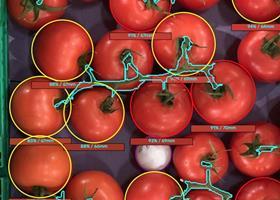
The idea for Clarifruit came to CEO and co-founder Avi Schwartzer upon picking a surprisingly bland clementine in his garden, prompting his pursuit for a tool that could accurately determine the quality of a fruit or vegetable prior to picking. Finding none on the market, Schwartzer, then a manager for Hewlett Packard’s QC automation product in Israel, set about developing one himself.
What Schwartzer realised was that software and fresh produce were two similar merchandises, both constantly changing on a daily basis, creating the need for a continuous testing process that would be consistent, quick and cost-effective.
According to Elad Mardix, president of Clarifruit, the idea was to develop a software solution that could: (a) digitise and automate the data collection process on the inspector side; (b) create consistent and objective quality standards that would help reduce rejections, “price adjustment” discussions and, ultimately, waste across the supply chain; and (c) empower growers, marketers, wholesalers and retailers to make data-informed decisions, helping them to maximise revenue opportunities with their customers.
Clarifruit’s QC software platform is composed of a mobile application for the inspector and a Management & Analytics dashboard for the QC/operations director, offering unique operational and sales insights. The mobile application allows the inspector to automatically analyse real-time data on external and internal attributes. The data is then processed at the cloud by a machine-learning algorithm that compares it to countless previous inspections and grades the quality within seconds.
“Users can access a real-time view of every inspection, including the date, time, user identification and GPS location, as well as mapping of all global operations at a glance,” says Mardix. Auto-generated reports, customisable to customer specifications, are generated for each completed inspection, while the digitisation of customer specs enables the exporter to best match produce quality with customer demand.
“Our vision is to transform the way QC is performed in the digital age and create a world standard for fresh produce evaluation,” he says. In addition to reducing waste and maximising companies’ profitability, Clarifruit’s software solution also democratises quality control, he explains, making it available for the first time to many smaller growers, and supporting the emergence of the online grocery business by ensuring alignment of quality expectations.
Mardix indicates that the relevance of Clarifruit’s digital platform has only grown in the new era of Covid-19, due to its ability to triple the productivity of inspectors, allowing customers to perform the same number of inspections with fewer employees, and even train them remotely.
“We have seen increasing engagement from customers over the last few months,” he confirms. “Our platform is already commercial for certain produce categories, such as table grapes, tomatoes, stonefruit, cherries, pineapples and a few others. We have been working with dozens of top five marketing companies and growers globally, including two of the world’s largest exporters of stonefruit, grapes and blueberries in Latin America, two of the top five global exporters of pineapples, as well as many top exporters across Europe and Asia. Recently we have also seen strong engagement from top global retailers. We are currently working with pilot partners on an additional ten produce categories to get them commercially ready over the next 12 months.”



